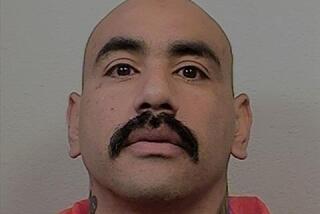The Inside Track : The Hot Corner : A consumer’s guide to the best and worst of sports media and merchandise. Ground rules: If it can be read, played, heard, observed, worn, viewed, dialed or downloaded, it’s in play here.
- Share via
What: “Fighting the Mob: The Story of Carmen Basilio”
Where: ESPN Classic, Tuesday, 6 p.m.
There was corruption in boxing long before Don King, and this one-hour documentary takes a look at a time from the late 1940s to the early ‘60s when the mob controlled the sport. The focal point of the one-hour documentary is Carmen Basilio, former welterweight and middleweight champion.
It is the third in an excellent series of “Sweet Science” historical boxing documentaries produced by ESPN Classic. “Shadow Boxing: the Journey of the African American Fighter,” was the first, followed by “Boxing in America.”
In “Fighting the Mob,” which is narrated by actor Paul Sorvino, it’s sometimes hard to keep track of the bad guys because there are so many. The leader of the pack is the notorious Frankie Carbo, who earned his stripes with the Vito Genovese crime family. Carbo eventually was convicted of illegal matchmaking and unlicensed managing, and was sentenced to 25 years in prison.
Basilio, 72, who lives in Rochester, N.Y., is interviewed at length.
He is best remembered for his two middleweight title fights with Sugar Ray Robinson. He won the first, in 1957, and lost a 15-round decision in the second, in 1958, fighting for 9 1/2 rounds with a left eye that was swollen shut. The day after that fight, a picture of Basilio’s battered face ran in newspapers across the country. It is one of boxing’s famous photos.
Basilio, who was only 5 feet 6 1/2, never liked Robinson.
“He had an arrogance about him I couldn’t stand,” he says.
He talks about how Robinson first gave him the brushoff in 1952 and how at that time he vowed to someday “kick his . . . “
Basilio’s career is well documented--the Hall of Famer retired with a record of 56-16-7 with 27 knockouts--but the corruption that comes out is what makes this film worthwhile.
Maybe the late sportswriter Jimmy Cannon sums up the era’s boxing best when he is shown saying, “I think boxing is a dirty racket. That’s the way it is going to be as long as a hoodlum thinks he can make a buck by muscling into it.”
You learn that fight-fixing was the norm in those days. It’s reported how Carbo wanted to fix the Robinson-Jake LaMotta fights, with Robinson winning the first, LaMotta the second and the third one being on the level. And they were talking about $100,000 payoffs back in those days. Robinson refused.
One of Basilio’s two managers, John De John, talks about how he thought he had to hook up with the mob to get Basilio a title shot.
But Basilio refused: “I said, ‘No way. I’ll get my shot. . . . I’m not giving it to them.’ I refused to give anything up.”
More to Read
Go beyond the scoreboard
Get the latest on L.A.'s teams in the daily Sports Report newsletter.
You may occasionally receive promotional content from the Los Angeles Times.










